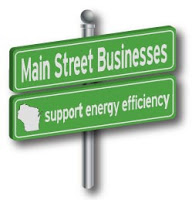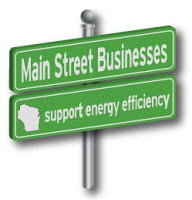
by jboullion | Jun 24, 2011 | Uncategorized
From an article by Charles Davis in the Green Bay Press Gazette:
Thousands of future jobs are at stake if Gov. Scott Walker doesn’t veto a provision in the state budget that limits funding for the Focus on Energy program, local business leaders said Wednesday.
“I see it being a real detriment to our business and our customers going forward if we don’t have these funding increases,” said Jeff Klonowski, regional manager of Kaukauna-based Energy Federation Inc., which supplies lighting fixtures, foam and weather-stripping materials to area contractors.
But supporters of the provision object to the amount of the funding increase, not the program.
“The Focus on Energy program certainly had a lot of benefits, but the huge increase in assessments that were put in place at the end of last year, we think, were too much, too soon,” said Scott Manley, director of environmental and energy policy for Wisconsin Manufacturers and Commerce, the state’s largest business lobby.
Walker received a letter Wednesday signed by more than 120 businesses asking that he veto that provision in the state budget bill. His office responded with a one-line statement: “We’ll evaluate that provision and make any veto-related announcements once the decisions have been finalized.”
The program
The statewide Focus on Energy program is funded by tax assessments on utility bills and provides grants to help homeowners and businesses pay for energy-efficient upgrades. It also helps pay for consultants to advise property owners on which type of upgrades would be practical and cost-effective. Each year, utility companies contribute 1.2 percent of revenue — about $100 million total — to the program.
The state Public Service Commission proposed in December raising the utility bill assessments from $94 million in 2010 to $256 million by 2014.
The proposal calls for utilities to increase their contributions to $120 million this year. That amount is fixed even if Walker does not veto the provision. However, assessments would drop to around $100 million in 2012, instead of the initial proposed increase of $160 million for that year.
Image by Clean Wisconsin

by jboullion | Jun 24, 2011 | Uncategorized
From an article by Charles Davis in the Green Bay Press Gazette:
Thousands of future jobs are at stake if Gov. Scott Walker doesn’t veto a provision in the state budget that limits funding for the Focus on Energy program, local business leaders said Wednesday.
“I see it being a real detriment to our business and our customers going forward if we don’t have these funding increases,” said Jeff Klonowski, regional manager of Kaukauna-based Energy Federation Inc., which supplies lighting fixtures, foam and weather-stripping materials to area contractors.
But supporters of the provision object to the amount of the funding increase, not the program.
“The Focus on Energy program certainly had a lot of benefits, but the huge increase in assessments that were put in place at the end of last year, we think, were too much, too soon,” said Scott Manley, director of environmental and energy policy for Wisconsin Manufacturers and Commerce, the state’s largest business lobby.
Walker received a letter Wednesday signed by more than 120 businesses asking that he veto that provision in the state budget bill. His office responded with a one-line statement: “We’ll evaluate that provision and make any veto-related announcements once the decisions have been finalized.”
The program
The statewide Focus on Energy program is funded by tax assessments on utility bills and provides grants to help homeowners and businesses pay for energy-efficient upgrades. It also helps pay for consultants to advise property owners on which type of upgrades would be practical and cost-effective. Each year, utility companies contribute 1.2 percent of revenue — about $100 million total — to the program.
The state Public Service Commission proposed in December raising the utility bill assessments from $94 million in 2010 to $256 million by 2014.
The proposal calls for utilities to increase their contributions to $120 million this year. That amount is fixed even if Walker does not veto the provision. However, assessments would drop to around $100 million in 2012, instead of the initial proposed increase of $160 million for that year.
Image by Clean Wisconsin
by jboullion | Jun 24, 2011 | Uncategorized
From a commentary by Jeff Anthony, American Wind Energy Association, on BizTimes.com:
The Wisconsin Assembly recently passed a bill that would enable hydroelectric power from Manitoba, Canada, to be shipped to Wisconsin to meet the state’s 2006 renewable energy law requiring 10 percent of the state’s electricity to come from renewable energy by the year 2015.
If enacted into law, the effect of the Manitoba Hydro Bill will be to ship jobs to Canada and reduce Wisconsin’s ability to meet its clean energy requirement by building more homegrown Wisconsin energy projects.
One of the bill’s sponsors, State Sen. Frank Lasee (R-De Pere), was quoted saying, “This new law will keep electric bills from going up by making it more affordable for utilities to meet green energy mandates.”
Unfortunately, he was mistaken in assuming that other forms of “green energy” will raise electricity rates in the state. If he had gotten his facts straight, he would have found that wind energy costs are at near-record lows, and many utilities in the U.S. are reaping the benefits of lower electricity rates as wind energy expands on their systems. But the facts about wind energy costs, like many other facts, apparently weren’t relevant in the rush to pass this ill-conceived bill.
What Sen. Lasee failed to mention is that his bill will also have a significant impact on Wisconsin by sending good-paying jobs that would otherwise have been created in Wisconsin – to Canada instead.
Sen. Lasee and the other state legislators who voted for the bill would have the state import electricity from Canadian energy projects that use Canadian workers. Today, Wisconsin supports 2,000-3,000 workers in the wind energy industry alone, and the Manitoba Hydro Bill now threatens many of those jobs in Wisconsin.
This is just the latest example of legislative activities that are exporting good-paying, clean energy jobs out of Wisconsin. Why?
At the beginning of the year, another onerous bill was proposed to impose extreme requirements on where Wisconsin wind projects can be located. A few weeks, later a joint committee of the legislature voted to suspend Wind Siting Rules that had been developed through a collaborative, open, and fair process. This rule was suspended by the joint legislative committee on the very day that these far better new rules would have taken effect.
Combined, these actions have jeopardized approximately 700 megawatts of wind projects that were proposed in the state, resulting in the potential loss of $1.8 billion investments and 2 million construction job-hours. And guess what – those 2 million job-hours will not show up in Wisconsin, and will likely move to neighboring states.
So what will be the next step in the “Wisconsin Jobs Export Agenda”?
Well, another piece of anti-clean energy job legislation has emerged, Assembly Bill 146, which would significantly reduce the growth of renewable energy in the state. The Wisconsin clean energy law was originally created to incentivize new renewable energy development and increase fuel diversity. AB 146 would effectively remove that incentive.
by jboullion | Jun 23, 2011 | Uncategorized
Two articles from Catching Wind, a newsletter published by RENEW Wisconsin with funding from a grant from the U.S. Department of Energy:
State’s Hostility Toward Renewables Escalates
At the urging of Wisconsin utilities, several lawmakers have introduced a bill to allow a renewable energy credit (REC) to be banked indefinitely. If adopted, this measure (AB146) would constitute the most devastating legislative assault yet on the state’s renewable energy marketplace, which is already reeling from the suspension of the statewide wind siting rule this March and the loosening of renewable energy definitions to allow Wisconsin utilities to count electricity generated from large Canadian hydro projects toward their renewable energy requirements.
“Leaders” Lag Citizenry on Wind Support
Public support for wind energy development has held strong against the attacks launched by Governor Walker and the Legislature’s new Republican majority, according to a poll conducted between April 11 and April 18 by the St. Norbert College Survey Center for Wisconsin Public Radio.
Asked whether Wisconsin should “increase, decrease or continue with the same amount” of energy supply from various sources, 77% favored increasing wind power, the highest of any option (60% favored increasing hydropower, 54% biomass, 39% natural gas, 27% nuclear, and 19% coal).
by jboullion | Jun 23, 2011 | Uncategorized
Two articles from Catching Wind, a newsletter published by RENEW Wisconsin with funding from a grant from the U.S. Department of Energy:
State’s Hostility Toward Renewables Escalates
At the urging of Wisconsin utilities, several lawmakers have introduced a bill to allow a renewable energy credit (REC) to be banked indefinitely. If adopted, this measure (AB146) would constitute the most devastating legislative assault yet on the state’s renewable energy marketplace, which is already reeling from the suspension of the statewide wind siting rule this March and the loosening of renewable energy definitions to allow Wisconsin utilities to count electricity generated from large Canadian hydro projects toward their renewable energy requirements.
“Leaders” Lag Citizenry on Wind Support
Public support for wind energy development has held strong against the attacks launched by Governor Walker and the Legislature’s new Republican majority, according to a poll conducted between April 11 and April 18 by the St. Norbert College Survey Center for Wisconsin Public Radio.
Asked whether Wisconsin should “increase, decrease or continue with the same amount” of energy supply from various sources, 77% favored increasing wind power, the highest of any option (60% favored increasing hydropower, 54% biomass, 39% natural gas, 27% nuclear, and 19% coal).


